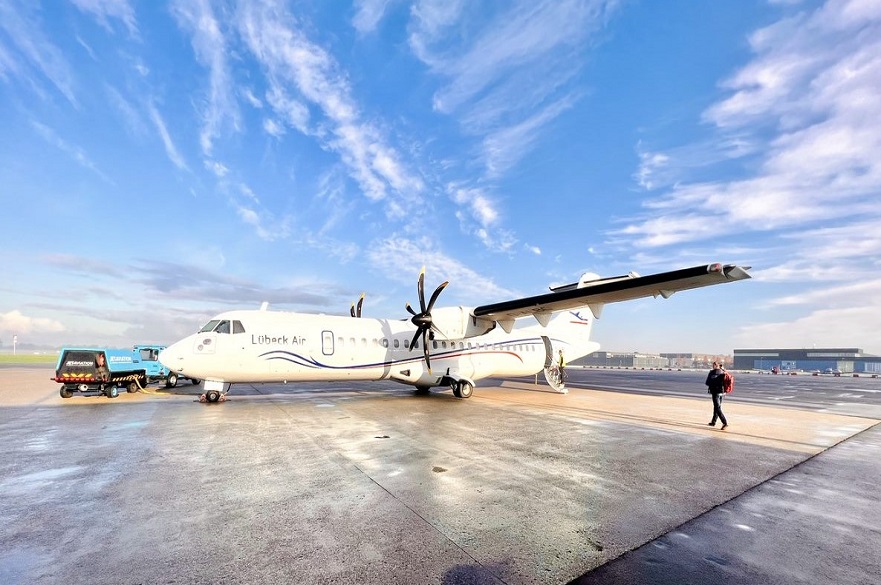Noise and vibration biggest factors in passenger discomfort onboard propeller aircraft, study shows
A lack of leg room is a well-known grumble among passengers on flights – but noise in the cabin is the number one gripe when it comes to propeller aircraft, a new study suggests.
By Dave Rogers | Published on 21 April 2022
Categories: Press office; Research; School of Science and Technology;

Experts in design engineering at Nottingham Trent University wanted to identify passenger preferences when flying ‘turboprop’ aircraft, which are expected to become more common as we move towards more sustainable ways of flying than by jet.
The research – which also involved Delft University of Technology in Holland and Ludwig Maximilian University of Munich – looked at what passengers found most and least comfortable when flying on these aircraft, which are predominantly used for regional flights.
As part of the study participants undertook a 70-minute flight on a specially chartered turboprop aircraft, at a cruising altitude of 17,000ft.
Several questionnaires were completed and participants were asked at different points – ascent, cruise and descent – which factors were contributing most to their comfort and discomfort.
After the flight, the vast majority (91%) of passengers stated that ‘noise’ affected their discomfort in the cabin, while two-thirds (63%) said ‘vibration’ and over half (53%) said ‘seat’.
Space, lighting and temperature in the cabin, meanwhile, were the factors which influenced the comfort the most for passengers, the researchers found.
For many years comfort has been an important factor for passengers choosing an airline and with sustainability becoming more important for passengers the team wanted to investigate the overall comfort experience of the more fuel efficient turboprops.
The team argues that for future propeller aircraft design it would be wise to look at noise reduction systems and vibration dampening materials. Noise-cancelling headphones could be made available for passengers.
Mechanical solutions could include adapting the propeller position so that there is less aerodynamic interaction with the rest of the airframe, they say.
“If we are serious about emissions, future propulsion has to move away from jets for regional flights,” said Professor Neil Mansfield, head of engineering in Nottingham Trent University’s School of Science and Technology.
He said: “We need to understand the environment of propeller aircraft so that future designs can be made more comfortable and acceptable to the market. There are ways to reduce the noise with noise cancelling or by designing the sound to be less unpleasant.”
The study is reported in the International Journal of Aviation, Aeronautics and Aerospace and was funded by the European Commission as part of the CleanSky ComfDemo project.
Notes for Editors
Press enquiries please contact Dave Rogers, Public Relations Manager, on telephone +44 (0)115 848 8782, or via email.
This project has received funding from the Clean Sky 2 Joint Undertaking (JU) under grant agreement 945583 (ComfDemo).
Nottingham Trent University (NTU) received the Queens Anniversary Prize for Higher and Further Education in 2021 for cultural heritage science research. It is the second time that NTU has been bestowed the honour of receiving a Queen’s Anniversary Prize for its research, the first being in 2015 for leading-edge research on the safety and security of global citizens. NTU was awarded Outstanding Support for Students 2020 (Times Higher Education Awards). It was the University of the Year 2019 (Guardian University Awards, UK Social Mobility Awards), Modern University of the Year 2018 (Times and Sunday Times Good University Guide) and University of the Year 2017 (Times Higher Education Awards). NTU is one of the UK’s largest universities, with over 33,000 students and more than 4,000 staff located across five campuses. It has an international student population of 4,000 and an NTU community representing around 160 countries. In the past 15 years, NTU has invested £450 million in tools, technology and facilities. NTU is in the UK’s top 10 for number of applications and ranked first for accepted offers (2019 UCAS UG acceptance data) It is also among the UK’s top five recruiters of students from disadvantaged backgrounds. 75% of NTU students go on to graduate-level employment or graduate-entry education / training within fifteen months of graduating (Guardian University Guide 2021). NTU is 4th globally (and 3rd in the UK) for sustainability in the 2021 UI Green Metric University World Rankings (out of more than 900 participating universities).